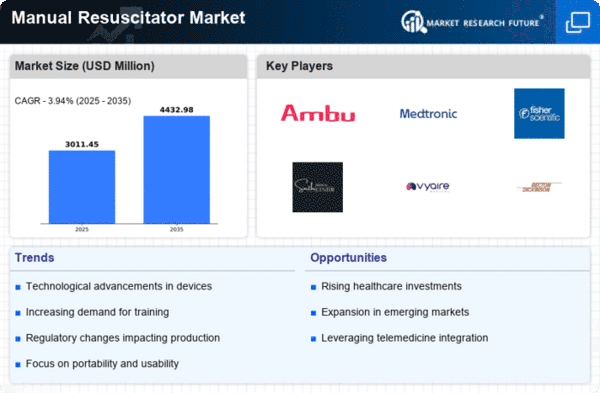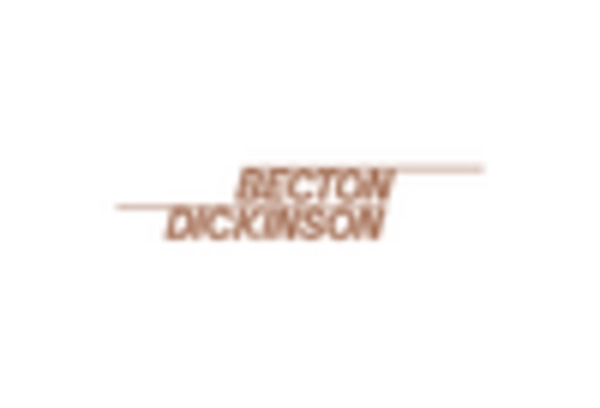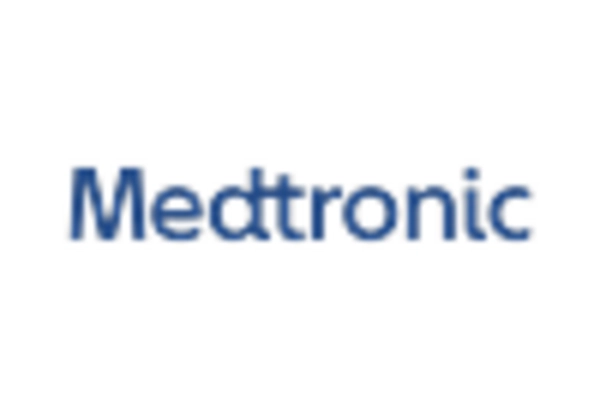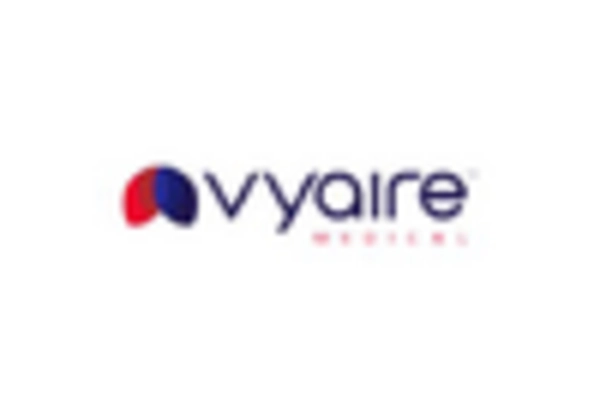Expansion of Healthcare Infrastructure
The expansion of healthcare infrastructure globally is a significant driver for the Global Manual Resuscitator Market Industry. As countries invest in healthcare facilities, particularly in developing regions, the demand for essential medical equipment, including manual resuscitators, is likely to increase. Enhanced healthcare infrastructure not only facilitates better access to emergency medical services but also promotes the training of healthcare personnel in the use of these devices. This trend is expected to bolster the market, with projections indicating a steady growth trajectory as healthcare systems evolve to meet the needs of growing populations.
Regulatory Support for Medical Devices
Regulatory frameworks play a crucial role in shaping the Global Manual Resuscitator Market Industry. Governments worldwide are implementing policies that promote the use of certified medical devices, including manual resuscitators, in healthcare settings. This regulatory support not only ensures the safety and efficacy of these devices but also encourages manufacturers to innovate and improve their offerings. As a result, the market is likely to see an influx of new products that meet stringent regulatory standards. This supportive environment is expected to contribute to the overall growth of the market, aligning with the increasing demand for reliable resuscitation solutions.
Increasing Demand for Emergency Medical Services
The Global Manual Resuscitator Market Industry is experiencing heightened demand due to the increasing prevalence of emergency medical services. As urban populations grow, the need for immediate medical assistance rises, leading to a greater reliance on manual resuscitators. In 2024, the market is projected to reach 2.9 USD Billion, reflecting the urgency for effective resuscitation tools in emergency situations. This trend is particularly evident in regions with high population density, where timely medical intervention is critical. The emphasis on training healthcare professionals in the use of manual resuscitators further supports this demand, ensuring that these devices are readily available and effectively utilized in emergencies.
Growing Awareness of Cardiopulmonary Resuscitation
The Global Manual Resuscitator Market Industry is benefiting from the increasing awareness surrounding cardiopulmonary resuscitation (CPR) techniques. Educational campaigns and training programs aimed at both healthcare professionals and the general public are fostering a culture of preparedness for cardiac emergencies. As more individuals become trained in CPR, the demand for manual resuscitators is likely to rise, as these devices are essential for effective resuscitation. This growing awareness is expected to sustain the market's growth trajectory, with a projected compound annual growth rate (CAGR) of 3.92% from 2025 to 2035, indicating a robust future for manual resuscitation tools.
Technological Advancements in Resuscitation Devices
Technological innovations are significantly influencing the Global Manual Resuscitator Market Industry. The introduction of lightweight, portable, and user-friendly manual resuscitators enhances their usability in various settings, including hospitals and ambulances. These advancements not only improve the efficiency of resuscitation efforts but also increase the adoption rate among healthcare providers. As the market evolves, manufacturers are focusing on integrating features such as improved valve mechanisms and enhanced ergonomics, which are likely to attract more users. This trend is expected to contribute to the market's growth, with projections indicating a rise to 4.43 USD Billion by 2035, driven by ongoing technological improvements.
















